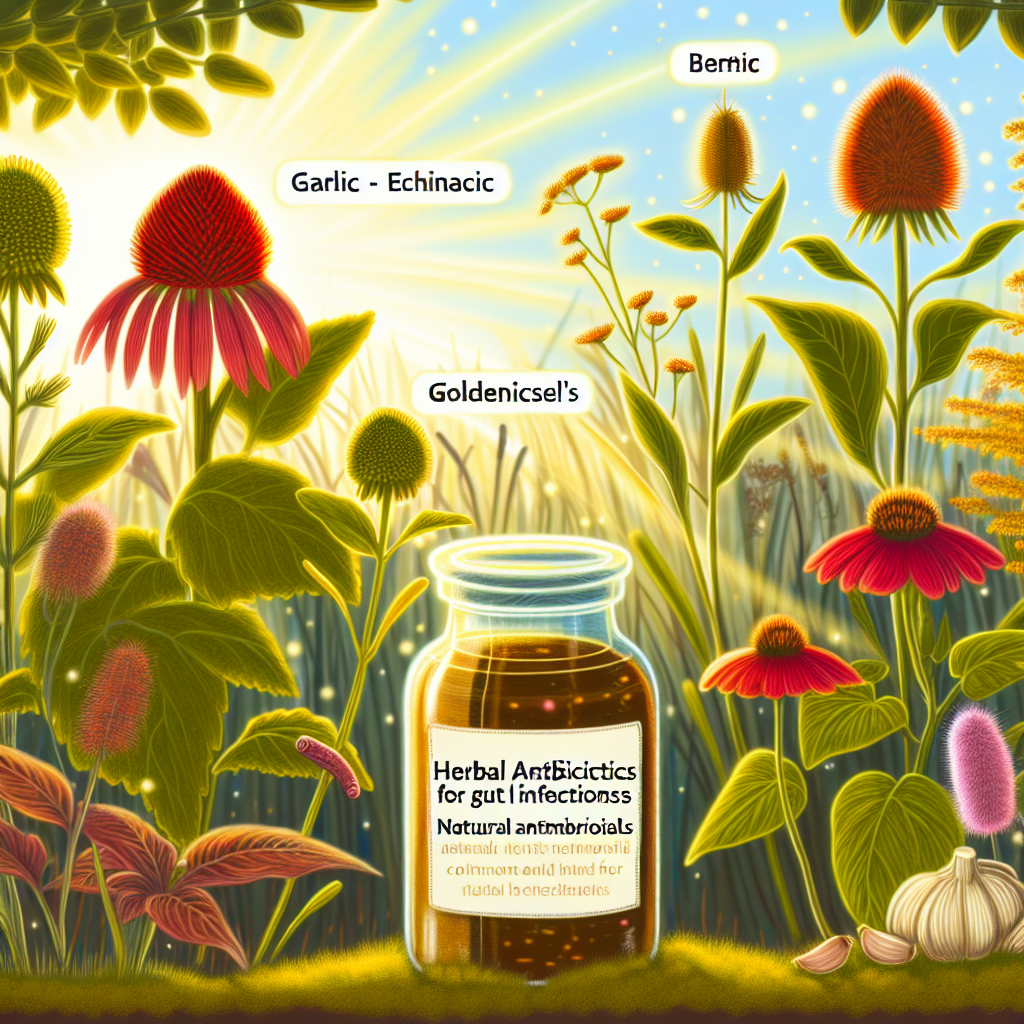Using Antimicrobial Herbs for Gut Balance
Introduction
A healthy gut is essential for overall wellness. The gut microbiome—the diverse community of bacteria, fungi, and other microorganisms in our digestive system—plays a critical role in digestion, nutrient absorption, immune function, and even mental health. However, an imbalance in gut bacteria, known as dysbiosis, can lead to digestive issues, inflammation, and a weakened immune system.
One natural approach to restoring and maintaining gut balance is the use of antimicrobial herbs. These plant-derived substances have been used for centuries in traditional medicine to combat harmful bacteria, viruses, fungi, and parasites while supporting beneficial microbes. Unlike pharmaceutical antibiotics, which often disrupt the entire microbiome and contribute to antibiotic resistance, antimicrobial herbs can selectively target harmful pathogens and promote a harmonious gut environment.
Herbal medicine offers a holistic and effective approach to gut health, with modern scientific research validating the benefits of many natural antimicrobials. These herbs contain potent bioactive compounds such as polyphenols, essential oils, flavonoids, and alkaloids that work synergistically to support digestion, reduce inflammation, and promote microbial balance. In addition, many antimicrobial herbs possess prebiotic properties, helping to nourish beneficial gut bacteria and fostering a thriving microbiome.
The overuse of antibiotics, a diet high in processed foods, and chronic stress are common contributors to gut dysbiosis. To restore gut health naturally, incorporating antimicrobial herbs alongside a balanced diet rich in fiber, fermented foods, and healthy fats can be a powerful solution. Some of the most effective antimicrobial herbs for gut balance include oregano, garlic, berberine, ginger, and thyme. Each of these herbs has been studied for its antimicrobial properties, demonstrating effectiveness against harmful pathogens without disturbing beneficial gut flora.
This article will explore some of the most potent antimicrobial herbs for gut health, examine the scientific research supporting their use, and provide insights into how these herbs can contribute to a healthy, balanced digestive system. By understanding how these natural remedies work, individuals can make informed choices to promote their gut health without relying solely on pharmaceuticals.
The Science Behind Antimicrobial Herbs
Several scientific studies support the use of antimicrobial herbs for gut balance. These herbs have been shown to target harmful microorganisms while promoting beneficial gut bacteria, making them valuable tools for maintaining digestive health. Let’s examine some of the most researched antimicrobial herbs and the evidence supporting their use.
Oregano: A Potent Antibacterial and Antifungal Herb
Oregano (*Origanum vulgare*) is well-known for its strong antimicrobial properties. The essential oil from oregano contains carvacrol and thymol, both of which have demonstrated antibacterial and antifungal activity.
A 2012 study published in *BMC Complementary Medicine and Therapies* found that oregano oil effectively inhibited the growth of *Escherichia coli* (E. coli) and *Salmonella* while having minimal impact on beneficial gut bacteria (1). Another study showed that oregano oil could help eliminate *Candida* overgrowth, a common cause of gut dysbiosis (2).
Garlic: A Natural Powerhouse Against Harmful Bacteria
Garlic (*Allium sativum*) has long been used as a natural antibacterial and antifungal agent. Allicin, its primary active compound, has been shown to inhibit harmful bacteria, including *Helicobacter pylori* (*H. pylori*), which is associated with gastritis and ulcers.
A study published in *Antimicrobial Agents and Chemotherapy* found that garlic extract exhibited antimicrobial activity against multi-drug-resistant bacterial strains while sparing beneficial lactobacilli and bifidobacteria (3).
Berberine: An Alkaloid with Strong Antimicrobial Effects
Berberine, found in goldenseal, barberry, and Oregon grape, is a bioactive alkaloid that has been studied for its antimicrobial effects against bacteria, fungi, and protozoa.
A study published in *Frontiers in Microbiology* reported that berberine could reduce the population of harmful bacteria like *Clostridium difficile* while promoting beneficial gut bacteria (4). Additionally, berberine has been found to improve gut barrier function, reducing intestinal permeability, commonly known as “leaky gut.”
Ginger: A Soothing and Antimicrobial Remedy
Ginger (*Zingiber officinale*) possesses antibacterial and antiviral properties, making it a valuable herb for gut health.
A 2016 study in the *International Journal of Food Microbiology* found that ginger extract inhibited the growth of *E. coli*, *Salmonella*, and other pathogenic bacteria while supporting intestinal health (5). Ginger also helps reduce inflammation and supports digestion by stimulating bile flow and enzyme secretion.
Thyme: An Aromatic Herb with Strong Antimicrobial Action
Thymol and carvacrol, active components in thyme (*Thymus vulgaris*), provide strong antimicrobial effects against harmful bacteria and fungi.
A 2018 study in *Phytotherapy Research* demonstrated that thyme essential oil could successfully inhibit *Staphylococcus aureus*, *E. coli*, and *Candida albicans* while leaving beneficial gut bacteria largely unaffected (6). Thyme also has antioxidant and anti-inflammatory properties that support overall digestive health.
Conclusion
The use of antimicrobial herbs for gut balance offers a natural and effective way to support digestive health without the drawbacks of pharmaceutical antibiotics. Herbs like oregano, garlic, berberine, ginger, and thyme contain powerful bioactive compounds that selectively target harmful microbes, promote beneficial gut bacteria, and reduce inflammation. Scientific research continues to validate the effectiveness of these natural remedies, making them viable alternatives for addressing gut dysbiosis.
Incorporating antimicrobial herbs into a balanced diet, alongside probiotics, fiber-rich foods, and lifestyle modifications, can enhance overall gut health. As with any natural remedy, consulting with a healthcare professional before introducing new herbs is advisable, especially for individuals with pre-existing conditions or those taking medications. By embracing natural solutions, individuals can cultivate a thriving gut microbiome and support long-term well-being.
Summary:
Antimicrobial herbs, such as oregano, garlic, berberine, ginger, and thyme, offer a natural and effective way to support gut health by selectively targeting harmful microbes, promoting beneficial gut bacteria, and reducing inflammation. Scientific research validates the use of these herbs as viable alternatives to address gut dysbiosis, making them valuable tools for maintaining a healthy, balanced digestive system.

Dominic E. is a passionate filmmaker navigating the exciting intersection of art and science. By day, he delves into the complexities of the human body as a full-time medical writer, meticulously translating intricate medical concepts into accessible and engaging narratives. By night, he explores the boundless realm of cinematic storytelling, crafting narratives that evoke emotion and challenge perspectives.
Film Student and Full-time Medical Writer for ContentVendor.com




